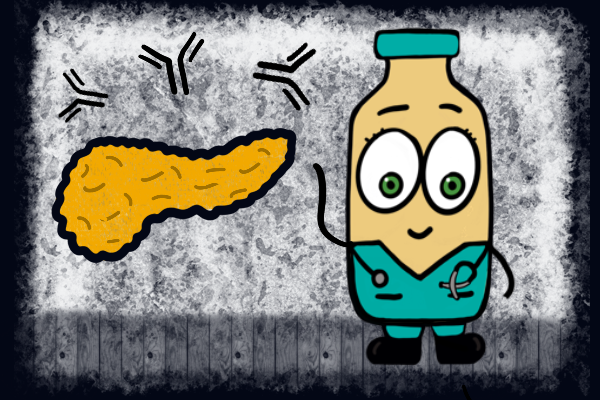WHAT CAUSES TYPE 1 DIABETES?
Type 1 diabetes is an autoimmune condition. Now, your immune system is normally there to protect you: it fights off infections of viruses and bacteria. It does this by putting a “marker” on something that it wants to remove, and tells the immune system, “If anyone sees this virus with a marker on it, attack!” We call these markers “antibodies.”
Sometimes, our bodies can get confused and make put one of these “markers” on something that needs to be there. In type 1 diabetes, the body’s immune system mistakenly attacks the cells in the pancreas that make insulin. Unfortunately, once the insulin production is stopped, it cannot be restarted again.
WHY DOES THIS HAPPEN?
Firstly, you didn’t do anything wrong. There’s nothing you did to cause your type 1 diabetes. And it’s definitely not because you ate too much sugar (despite what some people may tell you!)
Here’s how it works. It’s believed that some people are born with genes that make them more likely to get type 1 diabetes. (Genes are what you get from your mom and dad that determine your traits: hair color, eye color, height, etc.) But instead of determining your hair color, having these genes may allow a virus or some other thing (we don’t know exactly) to damage the insulin-making cells in your pancreas. Your immune system then responds by making antibodies and attacking these insulin-making cells.
TYPE 1 DIABETES ANTIBODIES
We can actually check to see if these type 1 diabetes antibodies are present in your blood. These blood tests have to be performed by a specialty laboratory and can take a few weeks for the results to return.
Some of the common antibodies that may be found in the blood of people with type 1 diabetes include:
- GAD antibody
- ZnT8 antibody
- insulin autoantibody (IAA)
- islet cell antibody
- ICA antibody
Interesting fact: These antibodies may be present in someone’s blood for years before they cause any signs of diabetes.
Since these antibodies can be found years before signs of diabetes appear, first-degree relatives (siblings, parents, children) of people with type 1 diabetes can be tested to see if they have any antibodies present. Research studies are using this early identification of antibodies to try to further delay and prevent type 1 diabetes from developing altogether!
TREATING TYPE 1 DIABETES
The treatment for type 1 diabetes is always insulin. You must replace the insulin that your body is no longer making. Insulin has to be given by either an injection or with an insulin pump.
You need to check your blood sugar levels regularly (at least 4 times each day) to make sure they stay in a healthy range. You can do this with a fingerstick glucose check with a glucometer or with a continuous glucose monitor (CGM).
Following a healthy eating plan and getting regular exercise are important parts of managing type 1 diabetes. However, it is important to note that healthy eating and exercise will not replace the need for insulin.
The Honeymoon Phase
Sometimes, especially right after diagnosis, it is common to have a “honeymoon” phase where your pancreas can start making some insulin. Your insulin doses may go down and it can almost look like you don’t have diabetes anymore, but don’t let your guard down! You still have diabetes and eventually your insulin production will go down to zero. This phase can last from a few weeks to even a few years (or sometimes not happen at all).
WHAT’S NEXT?
Lesson 2 is complete! You’re on a roll! We looked closer at the causes and treatment of type 1 diabetes. But what about type 2 diabetes? Why can someone with type 2 diabetes take pills while someone with type 1 has to take injections? Let’s find out together here!
